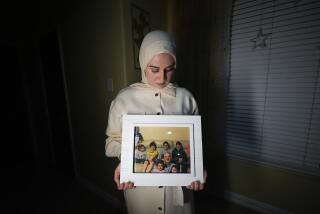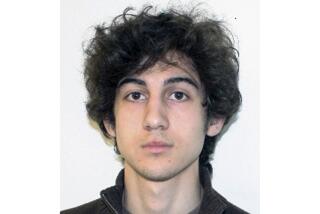Boston jurors hear details of dead bomber’s trip to Russia in search of jihad
- Share via
Reporting from Boston — Defense lawyers seeking to persuade a jury to spare Dzhokhar Tsarnaev’s life continued Wednesday to blame his dead older brother for the Boston Marathon bombings, insisting he was a Muslim extremist bent on violence long before the April 2013 attack.
The older brother, Tamerlan, had visited his family’s homeland in Dagestan, Russia, for six months in 2012 and appeared obsessed with joining Muslim militants there. “I came here to get involved in jihad,” he told a cousin, according to an FBI report.
The defense team cited that detail and others from a previously unknown FBI interview with the cousin two months after the bombings. The lawyers hope the evidence bolsters their portrayal of Tamerlan as the mastermind of the Boston attack and his younger brother as an accomplice under his control.
The cousin, Magomed Kartashov, was arrested by Russia’s security police in Dagestan shortly after the bombings, and had spent 40 days in jail when the FBI interviewed him.
It wasn’t clear Wednesday whether Kartashov was arrested because he was suspected of playing a role in the case, whether he knew about plans in advance, or was being held on other charges. His current status is unknown.
According to the FBI report of the interview, Kartashov said he and other family members had watched TV coverage in Russia of the Boston bombings, and that he suspected Tamerlan might have been involved.
Kartashov told the FBI that Tamerlan boasted of his resolve to join an extremist group almost from the start of his visit, and spoke of joining militants in Syria, the Palestinian territory or Russia itself before he returned to Boston in fall 2012.
He also said Tamerlan liked to quote verses from the Koran at family gatherings in Dagestan and in online chat rooms.
“He knew some parts of the Koran,” Kartashov said. “There was a particular one that Tamerlan used that said, ‘Cut their heads off and make them kneel in front of you.’”
Kartashov said he and others explained that websites from radical groups gave the wrong idea about conditions in Dagestan. “Tamerlan was under the impression that here was jihad in the streets,” he told the FBI.
After Tamerlan asked whether he “had any radical connections to Islam” and or other connections to militants, Kartashov warned him to “stop talking like that” or he would put their lives in danger.
He said Tamerlan calmed down. But before he returned to Boston, he told Kartashov, “You’ve convinced my head but my heart still wants to do something.”
Defense lawyers argue that Tamerlan dominated and intimidated Dzhokhar, who was 19 at the time of the bombings, seven years younger than his brother.
The brothers detonated two homemade bombs near the race finish line, killing three people and injuring more than 260 others.
Tamerlan was killed during the police manhunt that followed. Dzhokhar was convicted of 30 charges, including 17 that carry the death penalty. His lawyers are trying to convince the jury to instead sentence him to life in prison without parole.
Defense lawyers also brought to court several of Dzhokhar’s former teachers, who recalled him as “quiet, friendly and humble” and a “really lovely person.”
Prosecutors countered that behavior was years before he took part in the bombings.
A college friend, Tiarrah Dottin, described Dzhokhar as “quiet, loyal and kind of fun,” but shy and hard to know. Under cross examination by prosecutors, she said she did not know he was secretly reading terrorist propaganda on his school computer.
Alexa Guevara, another college friend, cried on the witness stand. “I really miss the person that I knew,” she said.
richard.serrano@latimes.com
Twitter: @RickSerranoLAT
More to Read
Sign up for Essential California
The most important California stories and recommendations in your inbox every morning.
You may occasionally receive promotional content from the Los Angeles Times.














